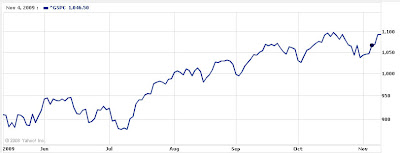

Inflation is too much money chasing too few goods. It never happens uniformly. That is, when real estate was going up by 50%, the price of nuts and bolts at Home Depot was not also going up by 50%. In the cases above, we have lots of easy money in the form of unnaturally low interest rates from the Fed and cataracts of newly minted greenbacks floating around, needing to go somewhere. Meanwhile, there is no rational reason for the growth in these two indexes - there hasn't been a huge jump in corporate profits and the supply of gold is pretty much the same as always.
Sounds like inflation to me.
7 comments:
I was confused for a moment, thinking "wow, gold trades tick for tick with the S&P?" then I realized you posted two identical charts
One think I've been thinking about is this: It seems to me that, when you get right down to it, "money" is debt[1]. Over the last few decades, we've had ballooning levels of debt, which the debt-holders treated as increased levels of money. When that debt turned out to be bad debt, that "money" vanished. In effect, the economy set fire to a huge pile of money. But, prices had already increased due to the creation of all that "money". Currently, I think the theory of the government is that they are going to deficit-spend until they recreate that money. So, the reason we "aren't seeing inflation" is because the inflation has *already happened*. The current money-printing activities of the government won't "increase inflation" until it exceeds the amount of "money" that was destroyed over the last two years. At that point, they will almost certainly not be able/willing to suddenly stop spending, and *that's* when I think we'll see inflation tick up rather sharply. The big problem is convincing people that this is likely to happen, even while we are still coasting along with the massive deficit not causing immediately obvious inflation problems.
[1] Why I say this: let's say we have three people, and no economy. A grows food; B wants some. So, B makes out a promissory note to A for some good or service. A doesn't need that particular good or service, so he trades the note, which represents B's debt to him, to C in exchange for what C has. At this point, that debt note has become indistinguishable from what I consider money - A, B, and C can trade it around all they want (although, B can in principle destroy it by just supplying the originally-agreed good or service, or by abruptly declaring that he doesn't intend to honor it).
All that government money-printing activities add to this is to introduce a standardized counter that people can use to represent these promissory notes.
Jeff, that happened because I'm an idiot. I'll change that right now.
"A jobless recovery is nothing more than a euphemism for a monetary asset bubble..." Jesse of Jesse's Café Américain.
H/T W.C. Varone's blog.
B-Daddy, that was a great quote. I visited both of those sites and found goldbugs and crash-a-holics. I agree with their take on the problems, but in order for there to be a run on the Dollar, there's got to be somewhere to run to.
The Yen will be the first to go, by the way. More on that later.
Tim, you've hit the nail on the head with respect to the lack of consumer inflation. The real estate crash obliterated money. Having said that, the insanely low interest rates at the Fed is driving yet another debt-induced bubble, this time in stocks and commodities.
We'll do anything to keep from having to earn what we buy!
Someone thinks we're out of gold....
I think what I'm reading here is that money's not real until someone tries to cash it in. Wasn't that one of the causes of 1929 crash? Everybody was extended on credit, and when the banks asked to see the collateral, things collapsed?
(drogicte)
Post a Comment